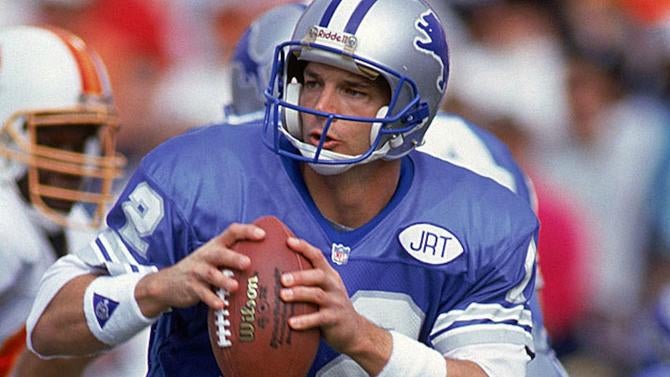
Former Lions quarterback Erik Kramer is lucky to be alive. Less than a year ago, Kramer tried to take his own life while sitting alone in a hotel room in Southern California.
Over a period of two months, Kramer slowly lost the will to live, so he decided to plan his suicide: He bought a gun, he wrote suicide letters for various family members, he was ready for life to end.
On Aug. 18, 2015, he shot himself in the head, and survived.
In an interview with the Detroit Free Press, the former NFL quarterback finally opened up about what led to his suicide attempt and how his life's going now.
On the night of his suicide attempt, Kramer drove to a hotel in Calabasas, California, a city about 30 miles outside of Los Angeles.
"It was time to either do it or not do it," Kramer told the Free Press. "I think I hung out for a little bit. I think I may have gone to eat some dinner somewhere and then came back and, I don't know what time, but sort of took the gun, crawled into bed and pulled the trigger."
Kramer didn't die, but the bullet did do some serious damage. According to the Free Press, the bullet "traveled through his chin, left a hole in his tongue, went up through his sinus cavities and out the top of his head."
The damage was so devastating that Kramer was placed in a medically induced coma for six weeks.
After news first broke of Kramer's suicide attempt, his ex-wife, Marshawn, attributed it to depression brought on by playing football.
"He is a very amazing man, a beautiful soul, but he has suffered depression since he was with the Bears," Marshawn said in August 2015. "I can promise you he is not the same man I married."
Kramer admits that football may have been one of the causes of his depression, but not for the reason you think. The former NFL quarterback doesn't think concussions played a part in his deteriorating mental health.
"I've thought about that often, but nothing really stands out as connecting football to the sort of feeling I've had with depression," Kramer said. "It very well may be linked. It doesn't feel like it to me."
Instead, Kramer believes his depression started after he was injured in 1994, his first of five years with the Chicago Bears.
"I think it was the fall from grace (that first brought on the depression)," Kramer said. "Coming in as the starter and the free agent and then getting hurt, feeling better after a few weeks, like I could play, but then not getting an opportunity to. And I think that all played a part in it."
Kramer's depression was exacerbated during retirement: His 18-year-old son died of a heroin overdose in 2011 and his mom died of cancer in 2012.
"I would say there was an emptiness," Kramer said.
In June 2015, Kramer started to have suicidal thoughts. He would finally shoot himself two months later.
Despite being shot from point-blank range, Kramer told the Free Press that he didn't suffer any "permanent sensory loss nor significant cognitive impairment."
Kramer was lucky and he knows it.
"I don't want to tempt fate but, at this point, I feel very good," Kramer said. "And so my hope is to just keep living life and keep contributing and keep all that going."
It's been nine months since Kramer's failed suicide attempt and he's just happy to be alive.
Kramer's name is still a well-known one in the annals of the NFC Central/NFC North.
Kramer played for the Bears from 1994-98, a span that includes a 1995 season in which Kramer set Chicago single-season records for touchdown passes (29) and passing yards (3,838). As of the end of the 2015 season, both records still stand.
The 51-year-old was also the starting quarterback for the Lions during their last postseason win, which was a 38-6 thrashing of the Cowboys in January 1992. Kramer threw for 341 yards and three touchdowns in that game.






















